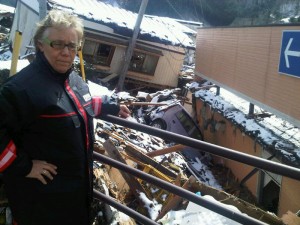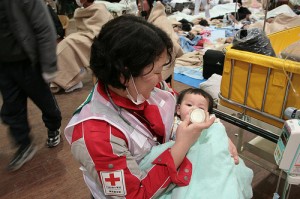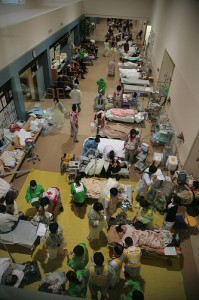He was doing a heroic job but was clearly overwhelmed by the scale of the disaster, repeating that for all their tsunami planning they never imagined something of this scale – with a wall of water racing past the tsunami evacuation signs that were thought to be sufficient.
We saw two of the six established (evacuation) centers, both in public schools. One was perched on a hill with sweeping views across a now empty flooded expanse littered with smashed houses – and beyond that a bay still full of flotsam. We walked up streets with homes untouched on one side and gutted on the other. That is how it is everywhere – a line where the wave reached and then it stopped.
The centers are cold with hundreds gathered in the gymnasium, a small kerosene heater no match against the big room. Many of the evacuees we saw were elderly and you could see the shock and exhaustion on their faces. The first few days people had one rice ball a day, then two and now, on the 6th day, are eating three meals a day. But without fuel and stoves there is no heat, and I hate to think how miserable it will be when night comes. No electricity means no water though there were some buckets for minimal washing.
There are some doctors and nurses from the town as well as some Japanese Red Cross mobile clinics but medicines for chronic disease are running out. But people receive our visit with enormous graciousness.
The scale of the damage is staggering. Cars are perched in trees and bent against bridge railings as if with a broken back. Boats are tossed across roads and a huge freighter is thrown halfway onto land. Apartment buildings miles inland have fourth floor windows swept away. Twisted metal beams and huge piles of splintered wood are everywhere. The air smells of dead fish and probably dead bodies, and the stink of the fires from the floating infernos – which scorched the hills – has permeated our clothes.
There is no question that the enormity of the situation would challenge any government. Hundreds of towns and villages are destroyed and thousands upon thousands of people have lost homes.
Koso did not know what would become of all those in his care. For sure the schools would postpone opening on April 6 but the gymnasiums are not tenable for the months and years it will take to rebuild. Where they will live while the enormous task of rebuilding takes place was beyond his imagination – and he was not sure how many would want to stay anyway in the place that had seemed so safe and was now so full of loss and grief.
And as we left snow began to fall on the silent town. (We’re) now in the car on the way back to Tokyo, and we are once again talking about the failed nuclear reactor. Apparently in addition to the contaminated houses, the farmland is too – so many additional lives and livelihoods are affected by this earthquake.
Nan and the rest of the international advisory group will continue to update us as they can. To learn more about the Japanese Red Cross response and the people being helped, visit our Disaster Online Newsroom.



